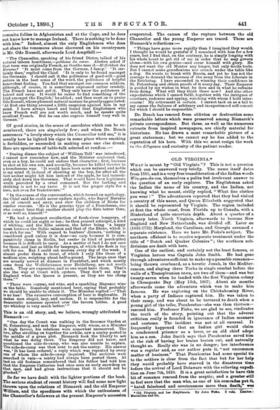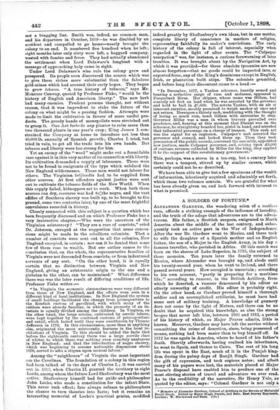OLD VIRGINIA.*
Wrtax is meant by "Old Virginia " P This is not a question which can be answered very briefly. The name itself dates from 1585, and is a very free transliteration of the Indian words Win-gan-da-coa, themselves a polite but irrelevant answer to the question of an early explorer. The Englishman asked the Indian the name of his country, and the Indian, not knowing what he meant, civilly replied, " What fine clothes you wear ! " The adventurers reported that they had visited a country of this name, and Queen Elizabeth suggested that it should be represented by Virginia. The region included at first the whole coast, from Florida up to Canada, with a Hinterland of quite uncertain depth. About a quarter of a century later, North Virginia, afterwards to become New England and New Netherlands, was divided off. Later on (1632.1732) Maryland, the Carolinas, and Georgia assumed separate existence. Here we have Mr. Fiske's subject. The northern offshoot is to receive separate treatment under the title of "Dutch and Quaker Colonies " ; the southern sub- divisions are dealt with here.
One of the earliest, and certainly not the least famous, of Virginian heroes was Captain John Smith. He had gone through adventures sufficient to make up a passable romance— being thrown overboard, as a heretic Jonah, in the Mediter- ranean, and slaying three Turks in single combat before the walls of a Transylvanian town, are two of them—and was but twenty-seven when he landed with the first Virginian colony in Chesapeake Bay (May 13th, 1607). About six months afterwards came the adventure which was to make him famous. He was exploring on the Chickahominy River, when a party of Indians captured him. He was taken to their camp, and was about to be tortured to death when a young girl of the tribe, Pocahontas—she was then thirteen— rescued him. Professor Fiske, we are glad to see, vindicates the truth of the story, pointing out that the adverse criticism really is founded in ignorance of Indian manners and customs. The incident was not at all unusual. It frequently happened that an Indian girl would claim a condemned prisoner as a lover, or an old chief adopt him as a son. John Smith says that Pocahontas saved him at the risk of having her brains beaten out, and naturally thought so. Really she was in no danger; her interference was a regular and, as our author puts it, " not uncommon matter of business." That Pocahontas had some special tie to the settlers is clear from the fact that but for her help they would probably have starved in the disastrous time before the arrival of Lord Delaware with the relieving expedi- tion on June 7th, 1610. It is a great satisfaction to have this bit of romance rescued from the sceptic; and a greater still to feel sure that the man who, as one of his comrades put it, " hated falsehood and covetousness more than death," was
• Old Virginia and her Neighbours. By John Make. 2 vela, raadma : Macmillan and Co.
not a bragging liar. Smith was, indeed, no common man, and his departure in October, 1609—he was disabled by an accident and compelled to go home—nearly brought the colony to an end. It numbered five hundred when he left ; eight months later only sixty were left, a haggard company, wasted with famine and fever. They had actually abandoned the settlement when Lord Delaware's longboat with a message of approaching help came in sight.
Under Lord Delaware's wise rule the colony grew and prospered. Its people soon discovered the source which was to give them riches more substantial than the fabulous gold-mines which had aroused their early hopes. They began to grow tobacco. " A true history of tobacco," says Mr. Moncure Conway, quoted by Professor Fiske, " would be the history of English and American liberty." The new herb had many enemies. Prudent persons thought, not without reason, that it was imprudent to stake the future of the colony on what might be a passing fashion. Attempts were made to limit the cultivation in favour of more useful pro- ducts. The greedy hands of monopolists were stretched out to grasp it. One Act forbade any planter to raise more than two thousand plants in one year's crop; King James I. con- strained the Company at home to introduce not less than 40,000 lb. annually of Spanish growth ; Charles I. tried, but tried in vain, to get all the trade into his own hands. But tobacco and liberty were too strong for him.
Yet an enemy of the "weed" might make out a formidable case against it in this very matter of its connection with liberty. Its cultivation demanded a supply of labourers. These were
not to be found in emigrants of the type which subdued the New England wildernesses. These men would not labour for others. The Virginian latifundia had to be supplied from other sources. At first offenders against justice were sent out to cultivate the tobacco fields of the New World. When this supply failed, kidnappers set to work. When both these sources ran dry, recourse was had to:the negro, and the vast edifice of Southern slavery was built up, to be brought to the ground, some two centuries later, by one of the most frightful convulsions recorded in history.
Closely connected with this subject is a question which has been frequently discussed and on which Professor Fiske has a very instructive chapter,—Who were the ancestors of the Virginian aristocracy ? "They are a race of convicts," cried Dr. Johnson, enraged at the suggestion that some conces- sions might be made to the rebellious colonists. That a number of convicts were sent out to all the colonies, New
England excepted, is certain ; nor can it be denied that some few of them rose to wealth. But our author comes to the conclusion that, on the whole, the representative families of
Virginia were not descended from convicts, or from indentured servants of any sort. " On the other hand, it is equally certain that no distinction between Virginia and New England, giving an aristocratic origin to the one and a plebeian to the other, can be maintained." What difference there was was the later result of differing conditions of life.
Professor Fiske writes :—
"In Virginia the economic circumstances were very different from those of New England, and the effects were seen in a different kind of local institutions. In New England the system of small holdings facilitated the change from primogeniture to the Kentish custom of gavelkind, with which many of the settlers were already familiar, in which the property of an in- testate is equally divided among the children. In Virginia, on the other hand, the large estates, cultivated by servile labour, were kept together by the combined customs of primogeniture and entail, which lasted until they were overthrown by Thomas Jefferson in 1776. In this circumstance, more than in anything else, originated the more aristocratic features in the local in- stitutions of Virginia. To this should be added the facts that before the eighteenth century there was a large servile class of whites, to which there was nothing even remotely analogous in New England ; and that the introduction of negro slavery, which was beginning to assume noticeable dimensions about 1670, served to affix a stigma upon manual labour."
Among the " neighbours " of Virginia the most important
are the Carolinas. The foundation of a colony in this region had been talked of in the days of Charles I. ; it was carried
out in 1663, when Charles II. granted the territory to eight Lords, among whom the future Lord Shaftesbury was the most active. Shaftesbury himself had for guide and philosopher John Locke, who made a constitution for the infant State. This never took effect; fate always refuses to philosophers the chance to turn theories into facts ; but it remains an interesting memorial of Locke's practical genius, modified indeed greatly by Shaftesbury's own ideas, but in one matter, complete liberty of conscience in matters of religion, representing faithfully its maker's convictions. The early history of the colony is full of interest, especially when regarded in the light of after events. The " Culpeper usurpation" was, for instance, a curious forewarning of later troubles. It was brought about by the Navigation Act, by which it was provided—for these obsolete tyrannies are now almost forgotten—that no goods could be imported into, or exported from, any of the King's dominions except in English, Irish, or plantation built ships. The colonists grumbled, and before long their discontent came to a head :—
" In December, 1677, a Yankee schooner, heavily armed and bearing a seductive cargo of rum and molasses, appeared in Pasquotank River. Her skipper, whose name was Gillam, had scarcely set foot on land when he was arrested by the governor and held to bail in £1,000. The astute Yankee, with an air of innocent surprise, meekly promised to weigh anchor at once and not return. Hereupon a thirsty mob, maddening with the thought of losing so much rum, beset Gillam with entreaties to stay. Governor Miller was a man in whom bravery prevailed over prudence, and, hearing at this moment that Durant was on the schooner, he straightway boarded her, pistol in hand, and arrested that influential personage on a charge of treason. This rash act was the signal for an explosion. Culpeper's mob arrested the governor and council, and locked them up. Then they took possession of the public records, convened the assembly, appointed new justices, made Culpeper governor, and, seizing upon £3,000 of customs revenue collected by Miller for the king, they applied it to the support of this revolutionary government."
This, perhaps, was a storm in a tea-cup, but a century later there was a tempest, stirred up by similar causes, which certainly could not be so described.
We have been able to give but a few specimens of the wealth of information, laboriously acquired and admirably set forth, which these two volumes contain. We are grateful for what has been already given us, and look forward with interest to what is promised.







































 Previous page
Previous page